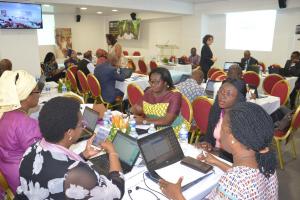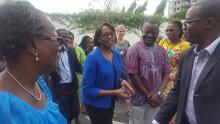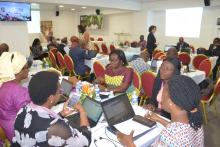HIV experts take stock of progress and challenges in tackling HIV among children and young adults, ahead of ICASA
Abidjan, December 3, 2017 - As thousands of international delegates converge in Abidjan, Côte d’ Ivoire for the bi-annual Conference on International Conference on AIDS and Sexually Transmitted Infections in Africa (ICASA) from December 4 to 9, the scene has been set, with some of the key issues that will be deliberated and discussed. The World Health Organization (WHO) and Elizabeth Glaser Paediatric AIDS Foundation (EGPAF) today convened a special forum on accelerating efforts to scale-up timely diagnosis and treatment for children and adolescents living with HIV.
The gathering of health experts, representatives from civil society organisations, UN Agencies and development partners that are 18 of 21 targeted countries as well as health ministries, met to assess progress made so far in treating children and young adults aged between 15 to 19, as well as the challenges and dynamics in advocacy, ensuring sustained access to treatment as well as information HIV, among these age groups.
WHO Regional Director for Africa Dr Matshidiso Moeti called on innovative approaches to diversify where to find children and young adults who need to be treated. “We need to start looking at where these children are born, where they are being treated as well as where to find adolescents and provide them with the information and support that they need, bearing in mind that they are in the vulnerable age group that is also under parental supervision,” stressed Dr Moeti
Dr Moeti also emphasised the need to ensure that there is sufficient public information in preventing young people, particularly women, from getting infected, citing examples of cases where these women re not empowered to negotiate safe sex. She stated: “We don’t want our young women, other adolescents and children to need treatment,”
The clarion call by HIV experts is Start Free, Stay Free and Aids Free, which is all about by preventing new HIV infections among children during pregnancy, birth and throughout the breastfeeding period; preventing new HIV infections among adolescents and young women as they grow up; and providing HIV treatment, care and support to children and adolescents living with HIV.
Although there has been a 50% decline in new infections globally, it is estimated d that it is 2.1 million children(0-14) and 1.2 million adolescents(15-19)are living with HIV. The target is to provide additional antiretroviral therapy to 1.6 million children by 2018. According to Chip Lyons, Chief Executive Officer of Elizabeth Glaser Paediatric AIDS Foundation (EGPAF), there were160,000 new paediatric infections in 21 countries in Africa in 2014. The target is to reduce these infections to 40,000 by 2018 and to 20,000 infections, two years later.
67% of adolescents living with HIV are in 11 African countries, namely Zimbabwe, Zambia, Uganda, South Africa, Chad, Mozambique, Kenya, Malawi, Tanzania, Nigeria and Cameroon. Dr Frank Lule, WHO focal point for Anti Retro Viral Treatment said it is not easy to reach adolescents because of their poor health seeking behavior especially those that are not sick.
Dr Gottfried Hirnschall of WHO said that new HIV infections in children and adolescents have declined with the AIDS mortality having halved to 110,000 from 210,000 in the last six years. He attributed this to intensified momentum and support from the 21 countries in Africa.
The meeting noted a number of success factors since 2015 - there’s been an almost universal adoption for treatment for all in several African countries; better policies and better tools in monitoring and treatment are now in place, there are hotlines for paediatric cases in several countries and an increased focus on service delivery. In the last two years, several countries have started increased efforts to improve identification of Prevention of Mother to Child Transmission, and introduced innovativeefforts to improve early identification and treatment of children and adolescents.
The 19th ICASA Conference, themed “Africa: Ending AIDS-delivering differently” will bring together over 7.000 of the world’s leading scientists, policy makers, activists, People Living in with HIV government leaders – as well as a number of heads of state and civil society representatives – to debate on how to achieve this vision. The ceremony will be officially open by President Alassane Ouattara of Côte d’ Ivoire on 4th December, 2017. Hundreds of delegates will also take part in a series of side events and meetings.


